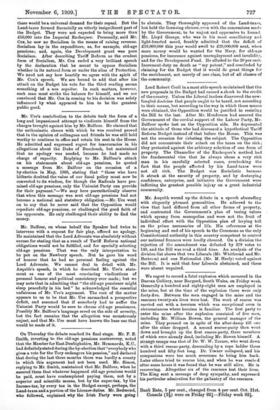Mr. Balfour, on whose behalf the Speaker had twice to
intervene with a request for fair play, offered no apology. He maintained that the Lord Advocate was absolutely without excuse for stating that as a result of Tariff Reform national obligations would not be fulfilled, and for specially selecting old-age pensions. That was the only interpretation to ha put on the Newbury speech. But be gave his word of honour that be had no personal feeling against the Lord Advocate. We cannot deal in detail with Mr. Asquith's speech, in which he described Mr. Ure's state- ment as one of the most convincing vindications of personal honour and political consistency ever made ; but we may note that in admitting that "the old-age pensioner might sleep peacefully in his bed" he acknowledged the essential unfairness of Mr. Ure's argument. The root of the matter appears to us to be that Mr. Ure earmarked a prospective deficit, and assumed that if somebody had to suffer the Unionist Party would be sure to choose old-age pensioners. Possibly Mr. Balfour's language erred on the side of severity, but the fact remains that the allegation was monstrously unjust, and that Mr. Ure must have known the base use that would be made of it.






























































 Previous page
Previous page